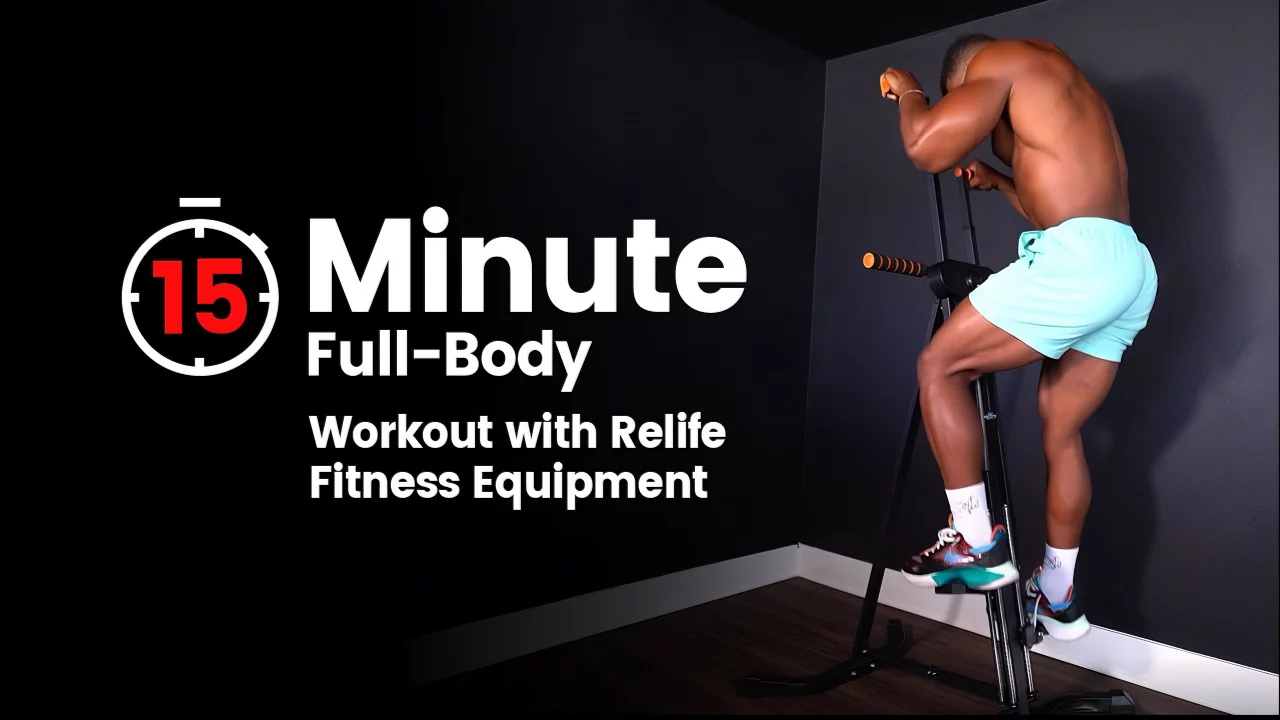Do Cardio Exercises
Increase
heartability & lose weight!
2023 Vertical Climber
Exercise Machine
4 interest-free payments or as low as $16/mo with Affirm
$169.99$399.99
2 in 1 Fold up Treadmill
| Under Desk Walking Pad
4 interest-free payments or as low as $16/mo with Affirm
$259.99$439.99
Limited Time & Limited Quantity
3 in 1 Exercise Bike
with Resistance Bands
heartability & lose weight!
2 in 1 Incline Treadmill
| Under Desk Walking Pad
with Foldable Handrail
-40% OFF
$439.99
$259.99
SUPER BIG DEALS
Limited Time & Limited Quantity
FEATURED PRODUCTS
Relife guarantees that we will refund you the difference if you find a lower price from us within 30 days of your purchase.
Price Difference Refund Requirements:
- Valid purchase history within 30 days.
- Email us a screenshot of the lower price.
- Promotion period only.
-
Relife guarantees that we will refund you the difference if you find a lower price from us within 30 days of your purchase.
Price Difference Refund Requirements:
- Valid purchase history within 30 days.
- Email us a screenshot of the lower price.
- Promotion period only.
-
Relife guarantees that we will refund you the difference if you find a lower price from us within 30 days of your purchase.
Price Difference Refund Requirements:
- Valid purchase history within 30 days.
- Email us a screenshot of the lower price.
- Promotion period only.
-
Relife guarantees that we will refund you the difference if you find a lower price from us within 30 days of your purchase.
Price Difference Refund Requirements:
- Valid purchase history within 30 days.
- Email us a screenshot of the lower price.
- Promotion period only.
-
Relife guarantees that we will refund you the difference if you find a lower price from us within 30 days of your purchase.
Price Difference Refund Requirements:
- Valid purchase history within 30 days.
- Email us a screenshot of the lower price.
- Promotion period only.
-
Relife guarantees that we will refund you the difference if you find a lower price from us within 30 days of your purchase.
Price Difference Refund Requirements:
- Valid purchase history within 30 days.
- Email us a screenshot of the lower price.
- Promotion period only.
-
Relife guarantees that we will refund you the difference if you find a lower price from us within 30 days of your purchase.
Price Difference Refund Requirements:
- Valid purchase history within 30 days.
- Email us a screenshot of the lower price.
- Promotion period only.
-
Relife guarantees that we will refund you the difference if you find a lower price from us within 30 days of your purchase.
Price Difference Refund Requirements:
- Valid purchase history within 30 days.
- Email us a screenshot of the lower price.
- Promotion period only.
-
Relife guarantees that we will refund you the difference if you find a lower price from us within 30 days of your purchase.
Price Difference Refund Requirements:
- Valid purchase history within 30 days.
- Email us a screenshot of the lower price.
- Promotion period only.
-
Relife guarantees that we will refund you the difference if you find a lower price from us within 30 days of your purchase.
Price Difference Refund Requirements:
- Valid purchase history within 30 days.
- Email us a screenshot of the lower price.
- Promotion period only.
-
Relife guarantees that we will refund you the difference if you find a lower price from us within 30 days of your purchase.
Price Difference Refund Requirements:
- Valid purchase history within 30 days.
- Email us a screenshot of the lower price.
- Promotion period only.
-
Relife guarantees that we will refund you the difference if you find a lower price from us within 30 days of your purchase.
Price Difference Refund Requirements:
- Valid purchase history within 30 days.
- Email us a screenshot of the lower price.
- Promotion period only.
-
Relife guarantees that we will refund you the difference if you find a lower price from us within 30 days of your purchase.
Price Difference Refund Requirements:
- Valid purchase history within 30 days.
- Email us a screenshot of the lower price.
- Promotion period only.
-
Relife guarantees that we will refund you the difference if you find a lower price from us within 30 days of your purchase.
Price Difference Refund Requirements:
- Valid purchase history within 30 days.
- Email us a screenshot of the lower price.
- Promotion period only.
-
Relife guarantees that we will refund you the difference if you find a lower price from us within 30 days of your purchase.
Price Difference Refund Requirements:
- Valid purchase history within 30 days.
- Email us a screenshot of the lower price.
- Promotion period only.
-
Relife guarantees that we will refund you the difference if you find a lower price from us within 30 days of your purchase.
Price Difference Refund Requirements:
- Valid purchase history within 30 days.
- Email us a screenshot of the lower price.
- Promotion period only.
-
Relife guarantees that we will refund you the difference if you find a lower price from us within 30 days of your purchase.
Price Difference Refund Requirements:
- Valid purchase history within 30 days.
- Email us a screenshot of the lower price.
- Promotion period only.
-
Relife guarantees that we will refund you the difference if you find a lower price from us within 30 days of your purchase.
Price Difference Refund Requirements:
- Valid purchase history within 30 days.
- Email us a screenshot of the lower price.
- Promotion period only.
-
Relife guarantees that we will refund you the difference if you find a lower price from us within 30 days of your purchase.
Price Difference Refund Requirements:
- Valid purchase history within 30 days.
- Email us a screenshot of the lower price.
- Promotion period only.
-
Relife guarantees that we will refund you the difference if you find a lower price from us within 30 days of your purchase.
Price Difference Refund Requirements:
- Valid purchase history within 30 days.
- Email us a screenshot of the lower price.
- Promotion period only.
-
Relife guarantees that we will refund you the difference if you find a lower price from us within 30 days of your purchase.
Price Difference Refund Requirements:
- Valid purchase history within 30 days.
- Email us a screenshot of the lower price.
- Promotion period only.
-
RELIFE STORY
RELIFE is headquartered at 17107 Gale Ave, City of Industry, CA 91745. AOTY SPORTS INC offers high-quality indoor fitness equipment to help people lead healthier lives.
RELIFE has a global following and has served over 3 million customers.
RELIFE STORY
RELIFE has a global following and has served over 3 million customers.

DAILY FITNESS, HEALTHY LIFE
Get after their health with relifesports. We see you out there, pushing yourself to new limits and achieving all that matters most in life to rebuild your life!
Relife Fitness Solutions
Join us to do 15-minute full-body workout featuring the amazing Relife fitness equipments.
Get ready to sweat with a high-intensity exercise bike, versatile power tower, adjustable weight bench, , vertical climber machine and challenging dumbbell exercises. Engage all major muscle groups, burn calories, and build strength in this action-packed workout session.
Enjoy 3-in-1 exercise bike journey at home
• Upright Mode/Semi-recumbent Mode/Recumbent Mode
• Suitable for different shapes and sizes of people
• Ideal for elderly
& post-operative rehabilitation
• Cycling burns more calories than other low impact workouts
The multi-function dip bar station is a great way to work out your chest, biceps and trisuits. With reinforced stability from safety connector feature of the dip stand station machine you can also do workouts for abs without worrying about falling off or sustaining injuries!
Treadmills are mostly used for cardio training.
Get in shape with this versatile fitness treadmill! It not only enhances your cardiovascular health but also strengthens your glutes, thighs, and calves.
It can also help with your weight loss goals.
Kickstart your weight loss journey by incorporating walking, jogging, or running into your daily routine.
Good Design Makes Eeveryone’s Life Better
That’s why we offer ergonomically designed power towers for people of all shapes and sizes. Whether you’re just starting out, or already in great shape, easy-to-use workout equipment is key to building up your strength without injury or discomfort.
Low-impact total-body 60 minute metabolic HIIT workout + abs 🔥 intense and sweaty, fat-killer body pump HIIT workout with weights and barbell designed for all fitness levels.
ADVICE FROM HEALTH EXPERTS
Get fit and stay that way with Relife's wide selection of workouts, recipes & health tips. We will help you feel inspired, and give practical tips for your health goals!
















































































